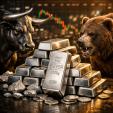"Where to Now" Depression 2006
Most of the professionals in Wall Street believe the economy bottomed in 2001 and the stock market made a major market LOW in November 2002 with a successful retest of that low in March 2003.
It was just 5 years ago that the greatest financial mania in all of history burst. The Bubble coincided with the longest peace time economic expansion and the greatest capital spending boom of all time. It flies in the face of every economic and logical principle I know of, that this Massive BUBBLE would be followed by the mildest recession in history and a bear market that never even reached fair valuation levels that would be considered the "norm", much less the under valuation levels reached at prior bear markets lows.
Most stock market analysts, the highest bullish percentage ever, believe that since we are having a substantial rebound in earnings and multi-decade lows in interest rates, that the environment is perfect for the resumption of a new bull market. They also point to the low inflation rate, history's strongest housing market, and the record levels of consumer confidence. The only thing that was lacking was a strong rebound in employment, which now looks like it too is ready to catch fire.
In contrast to what seems to be a near unanimous consensus, I believe that in spite of all the positive developments, they still do not come close to offsetting the negative developments which, for the most part, were caused by the bubble and remain unresolved. Like record Budget and Trade deficits, record levels of debt and extreme levels of stock market over valuation. The rebound in earnings, although back to the bubble highs, are just that, at bubble high's but is still not high enough to bring the market back to the undervalued levels of prior bear market lows. Actually, they are still not even close to bringing us back to normal valuation levels.
The liquidation of equity mutual funds in 2002 did not approach the levels of capitulations seen in past bear markets.
The low inflation rate and the multi-decade lows in interest rates, rather than being positive, could actually be the precursor of the dreaded deflation that Greenspan and company are so deathly afraid of.
In actual fact, the stock market rally of 2003-2004 is really only proportionate to the 5 Bear market rallies in the Japanese Nikkei Average during their 13 year bear market. The rebound in various economic statistics also is reminiscent of the Japanese deflationary environment. Other concerns are the tremendous amount of DEBT, Gov. Corporate and Personal, that has been incurred along with the record number of bankruptcies and housing foreclosures at the same time that we are in a supposedly strong economy.
The extremely low savings rate in the U.S. should be of concern, since this should be our primary source of investment, rather than relying on foreign savings as we are doing now. How long will the rest of the World keep sending us 80% of their savings.
Some of my other concerns get into more esoteric areas. These include the record budget deficit as a percentage of GDP, and the record current account deficit which, ironically, allows the budget deficit to be financed by Asia and Europe. Is there no concern that Asia is "printing" money like crazy in order to buy U.S. securities and finance our deficit and to keep their currencies from rising? What if they decided, that it is no longer in their best interest to continue this financial arrangement? Or what is probably more likely, their economies begin to show a strong recovery and they need their own savings for investment in their own economies?
What if they decided that they are building up too many US Dollar reserves and decide to diversify? As Korea has just announced that they will do? They have to weigh all of these factors in determining if this continuing to build reserves in a falling $US is worth it, so that their currencies can stay low enough to continue supporting their export industries.
Doesn't it concern investors that the Euro Zone's leaders are trying to influence the ECB to lower rates in an attempt to stall the Euro Currencies strength so they could better compete with the U.S? They have already imposed some sanctions against U.S. goods we are exporting to them and have expressed concerns about the "anti-dumping" policies of the U.S. If this continues we will be quickly sliding down the down slope of the "cycle of deflation". Greenspan has already touched on many of these issues in the past, but he still assumes a benign outcome, but conceded he is worried about "the clouds of emerging protectionism", stating that,"…it is imperative that creeping protectionism be thwarted and reversed". It is obvious that the Chairman, too, is concerned about the cycle of deflation. There are now 80 Protectionist Measures floating through congress.
I can't close without mentioning one of the main concerns I have with the economy and stock market and that is the corner; I believe Mr. Greenspan has painted himself into, which he is unlikely to be able to extricate us from without enormous financial implications. What if the Fed is correct and the economy continues the upswing? He will eventually have to raise rates to at least 5%. Although interest rates have been increased 6 times, they are still only at 3%. With inflation running at 3.5% to 4% that's still means a negative rate of 1%. However with debt loads as large as they are, with a bump in rates to 5%, the servicing of this debt will soon become so onerous that the economy will come to a screeching halt. Also, what do you think will be the stock market belated reaction once rates are increased enough to become positive once more. (above 3.5%) What about the housing market? Rising short interest rates have not affected long term mortgage rates yet but they soon will. Will they then preclude re-sales as well as the affordability of new sales? What happens to prices then?
What happens to the economy once Greenspan reaches his goal of a neutral level of interest rates? Will the economy then stall and resumes the incomplete recession of 2000 - 2001, and correct all those imbalances created by that financial stock market mania. This could turn out to be the worst case scenario and could trigger the beginning of that deflationary spiral that has caused Greenspan, Bernanke and the rest of the FED governors all those sleepless nights.
Conundrum
What conundrum? The whole world is awash in cash. The really rich have a different attitude than the rest of us when it comes to investing. Their primary objective, especially when valuation risks are as high as they are now, is Capital Preservation. And say what you will about the USA when the "S--- hits the Fan", there is no better place to be than US Treasuries. Plain and simple that's is why the 10 year treasuries are down by over1/2% in the face of the FED raising FED Funds by 2% during that same time frame. The world is now also in the biggest real estate Bubble mania of all time and like every other mania of the past its not a matter of "IF" but "When" the correction begins. The only question remaining is, how severe will the correction be? Keep in mind, its not just one but three mania's that still have to be corrected.
GOLD The next mania, which may have already started will be gold as every makes a mad dash for a safe haven. Say what you will; over the Millennia people have always run to GOLD as the best place to preserve your assets.
Aubie Baltin
Palm Beach Gardens, FL
561-840-9767
















